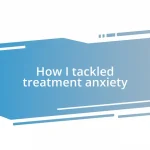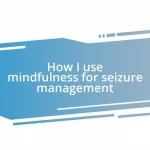Key takeaways:
- The author emphasizes the emotional journey of medication, balancing symptom management with unexpected side effects.
- Common side effects discussed include fatigue, nausea, and mood swings, highlighting the importance of self-advocacy and support.
- Effective coping strategies involve mindfulness practices, dietary adjustments, and open communication with healthcare providers.
- Sharing experiences with others fosters connection and support, alleviating feelings of isolation among those facing similar challenges.
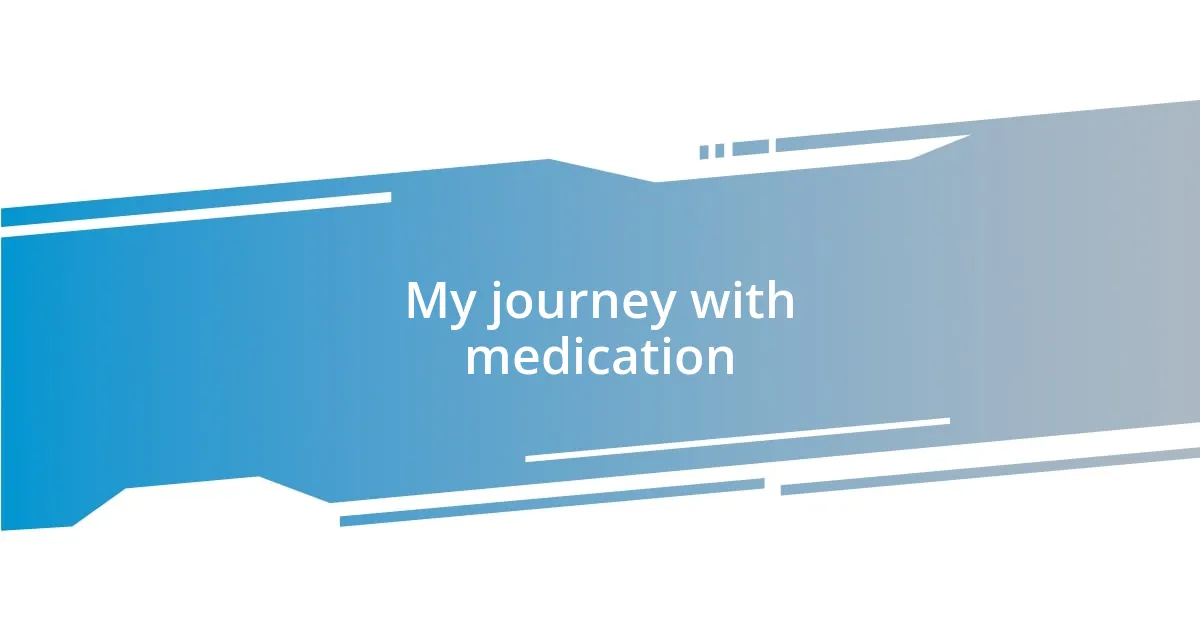
My journey with medication
My journey with medication hasn’t been a straight path; it’s been full of twists and turns. I remember the first time I took a new medication—I was both hopeful and afraid, anticipating what changes it might bring. But the initial relief quickly turned into confusion as I experienced side effects that I hadn’t expected.
One night, as I lay awake grappling with insomnia caused by my medication, I wondered, “Is this really worth it?” This question weighed heavily on my heart. I think it’s crucial for anyone dealing with similar situations to ask themselves the same thing—what does the balance look like between managing symptoms and navigating side effects? For me, it often felt like a pendulum swing, where every positive effect seemed shadowed by a new challenge.
Through the ups and downs, I learned to advocate for myself. I vividly recall one appointment where I openly shared my experiences with side effects. That moment of vulnerability was empowering. It reminded me that I wasn’t alone in this journey and that sharing my story might help someone else find their voice. Have you ever felt that moment where speaking out lifted a weight off your shoulders?
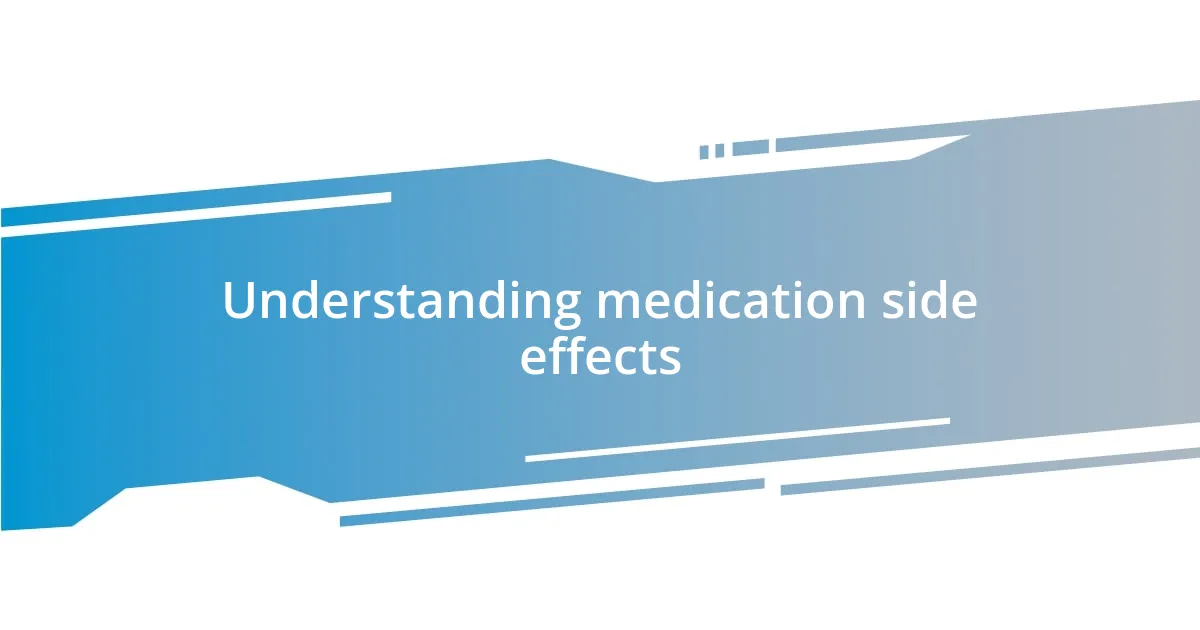
Understanding medication side effects
Understanding medication side effects is vital for those of us navigating the complex world of treatment. It’s really fascinating how each person’s body reacts differently; my experience was a tapestry woven from both unexpected highs and unsettling lows. There were days when I felt like a participant in an experiment, where side effects became new acquaintances rather than unwelcome visitors.
Here are some common medication side effects that can occur:
- Fatigue or drowsiness
- Nausea or upset stomach
- Changes in appetite or weight
- Sleep disturbances
- Mood swings or anxiety
Reflecting on my journey, I remember battling waves of discomfort that seemed relentless. I once found myself unable to get out of bed for a whole weekend. That led me to feel isolated, as if I had joined a secret society where others understood, yet I felt strange bringing it up. Each time I spoke to someone about these experiences, a part of me felt lighter, as if sharing the burden made it easier for both me and those who listened. It’s a reminder that understanding these side effects transforms our internal dialogue, allowing us to manage our health more effectively and compassionately.
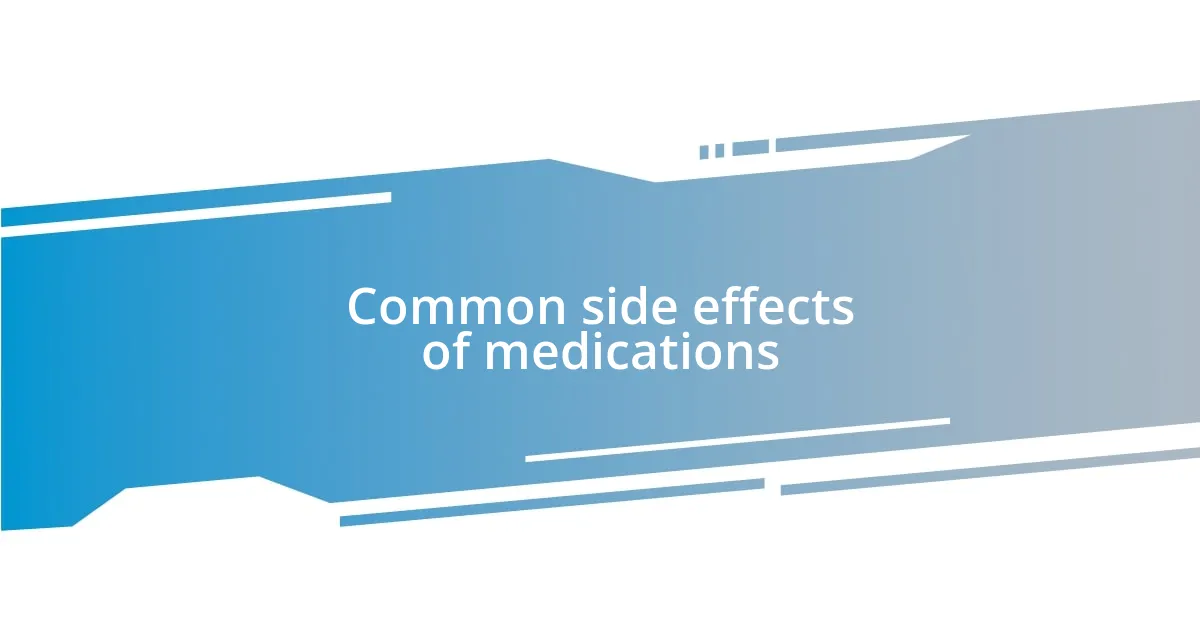
Common side effects of medications
When it comes to the common side effects of medications, I can tell you that fatigue tops the list. I remember a period when I started a new antidepressant, and it felt like pulling a heavy blanket over my mind. Even on days when I desperately wanted to be productive, I often found myself fighting to keep my eyes open. This overwhelming tiredness is something many people share, and it can be incredibly frustrating, especially when you have things to do.
Nausea is another frequent companion of several medications. For a long time, every morning felt like a rollercoaster for me. Some days, just the sight of food made my stomach churn. I learned to manage it, though—small meals became my best friend. Did you know that many over-the-counter medications can help ease this discomfort? It’s an example of how knowing about side effects can empower us to take control and find solutions.
One side effect that often gets overlooked is mood swings. Reflecting on my own experience, I recall conversations that left me bewildered—the highs would shoot up out of nowhere, followed by sudden lows that felt like a downturn I couldn’t predict. It reminded me that it’s essential to check in with oneself regularly. How do you navigate those emotional shifts? It’s about creating a support system, leaning on loved ones, and sometimes just being kind to yourself during those turbulent moments.
| Side Effect | Description |
|---|---|
| Fatigue | Extreme tiredness that affects daily activities. |
| Nausea | A feeling of sickness with an inclination to vomit. |
| Mood Swings | Sudden and intense changes in emotional state. |
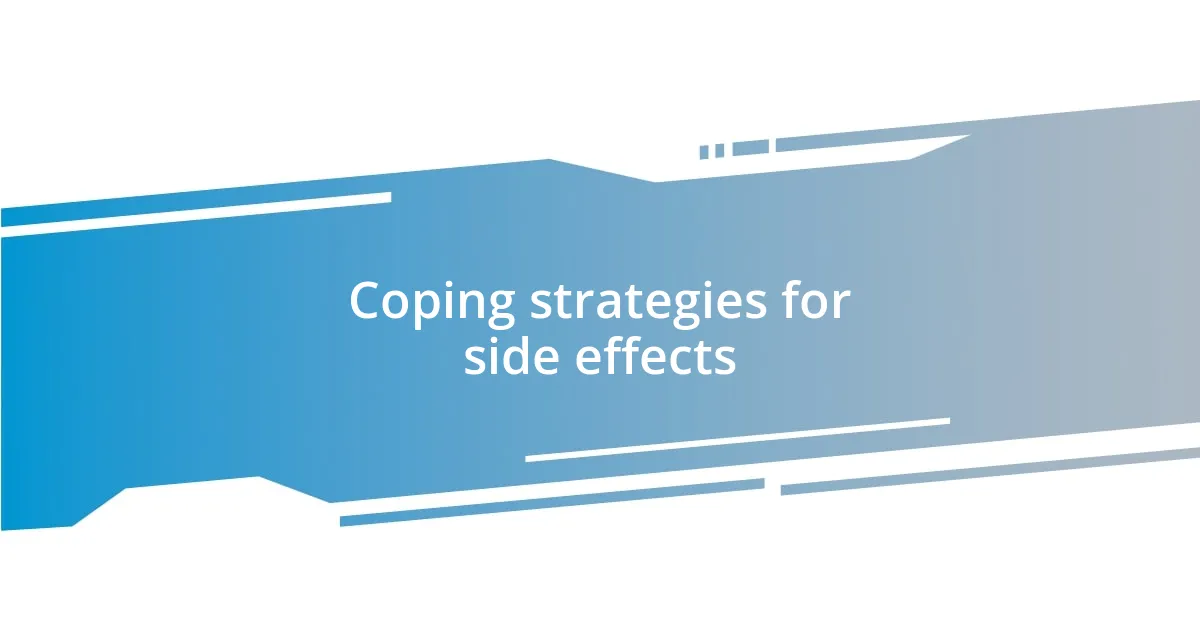
Coping strategies for side effects
Finding effective coping strategies for medication side effects has been crucial in my journey. For instance, during a phase when my anxiety levels soared like a kite caught in a storm, I turned to mindfulness practices. Meditation and deep-breathing exercises became my anchors, helping me ground myself. Have you ever tried simply sitting in silence and focusing on your breath? It’s incredible how just a few minutes can shift your perspective.
Diet adjustments also played a pivotal role in managing nausea. I vividly remember an experimental phase when I started keeping a food diary. I documented everything I ate alongside my symptoms, and over time, certain patterns emerged. By identifying the foods that triggered discomfort, I was able to create a meal plan that included gentler options. Have you ever considered how your meals can impact your mood and overall well-being? It’s fascinating to see those connections unfold.
Lastly, leaning on my support system proved invaluable. When mood swings left me feeling adrift, reaching out to friends and family often allowed me to articulate my feelings. I’ll never forget that one evening; I was having a rough patch, and a simple phone call to a close friend turned my entire night around. Just hearing someone say, “You’re not alone in this,” brought such comfort. Have you had moments where a conversation changed your whole outlook? It’s amazing how connection can serve as a balm for our emotional struggles.

Managing side effects effectively
Managing side effects effectively requires a combination of strategies. I remember my first experience with insomnia after starting a new medication. It was more than just bedtime troubles; it felt like I was trapped in a restless cycle. I gradually learned the value of establishing a bedtime routine. Simple changes like dimming the lights and reading a book instead of scrolling through my phone helped immensely. Have you ever noticed how small tweaks can make a big difference in your sleep quality?
Staying organized can also be a game-changer when it comes to managing side effects. I found that keeping a symptom journal not only helped me track how I was feeling but also assisted my healthcare provider in adjusting my treatment plan. Writing down my daily experiences, including what I ate and my emotional states, painted a clearer picture of patterns in my health. Have you ever tried journaling your experiences? Sometimes, documenting our thoughts can lead to surprising insights and clarity.
Most importantly, don’t shy away from communicating openly with your healthcare provider. When nausea hit hard during one of my treatment phases, I was hesitant to share how much it affected me. Eventually, I mustered the courage to speak up, and my doctor was able to modify my medication. It was reassuring to learn that these conversations could lead to practical changes. Have you experienced a similar revelation? Understanding that we are partners in our care can significantly impact our journey through side effects.

Sharing your experience with others
Sharing my experiences with medication side effects has often felt like opening a window to fresh air. Whenever I connect with someone who is going through something similar, it feels like we’re participants in a shared journey. I vividly remember a heartfelt discussion with a fellow patient in the waiting room, where we exchanged stories about our struggles. Hearing her say, “I thought I was the only one!” made me realize how vital these conversations can be.
I’ve also found that sharing my journey on social media offers a broader reach. Once, I posted about my battle with fatigue, and an avalanche of responses flooded in—people sharing not just their situations but also tips and encouragement. I couldn’t help but think, why do we often suffer in silence? That experience taught me how powerful collective sharing can be. It’s as if we form a safety net, catching each other when the going gets tough.
Even in more informal settings, talking about side effects can foster connections. I remember chatting with a barista at my local café who, out of the blue, started sharing her own medication story. It was refreshing to find common ground in an unexpected place. Have you ever had a seemingly casual conversation that turned into a deep reflection on shared experiences? These moments reinforce that we’re all navigating similar waters, and often, it’s the simplest exchanges that remind us we’re not alone.










